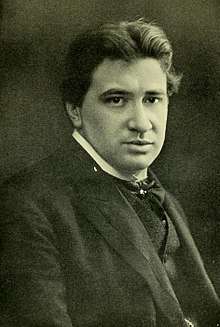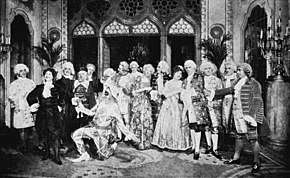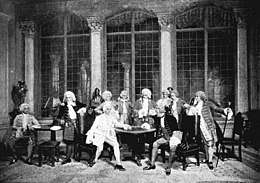Le donne curiose
Le donne curiose (English: The Inquisitive Women) is an opera in three acts by Ermanno Wolf-Ferrari to a text by Luigi Sugana after Carlo Goldoni's play of the same name.
| Le donne curiose | |
|---|---|
| Opera by Ermanno Wolf-Ferrari | |
 The composer in 1906 | |
| Translation | The Inquisitive Women |
| Librettist | Luigi Sugana |
| Language | Italian |
| Based on | Le donne curiose by Carlo Goldoni |
| Premiere | |
Performance history
The first dramatic work by Wolf-Ferrari to achieve more than local notice, it was first performed in Munich on 27 November 1903 in a German translation as Die neugierigen Frauen. The first performance in Italian was at the old Metropolitan Opera House in New York on 3 January 1912 with a cast led by Arturo Toscanini, including Geraldine Farrar and Hermann Jadlowker. Tullio Serafin conducted the first performance in Milan on 16 January 1913.
Roles

Geraldine Farrar and Hermann Jadlowker as Rosaura and Florindo

Scene from act 3
| Role | Voice type | Premiere cast, 27 November 1903[1] Conductor: Hugo Reichenberger |
First performance in Italian, 3 January 1912[2] Conductor: Arturo Toscanini |
|---|---|---|---|
| Arlecchino | bass | Georg Sieglitz | Antonio Scotti |
| Beatrice | mezzo-soprano | Charlotte Huhn | Rita Fornia |
| Colombina | soprano | Hermine Bosetti | Geraldine Farrar |
| Florindo | tenor | Hans Koppe | Hermann Jadlowker |
| Leandro | tenor | Hans Breuer | Jeanne Maubourg |
| Lelio | baritone | Andres de Segurola | |
| Ottavio | bass | Paul Bender | Adam Didur |
| Pantalone | baritone | Friedrich Brodersen | Antonio Pini-Corsi |
| Rosaura | soprano | Ella Tordek | Bella Alten |
| Lunardo | bass | ||
| Mènego | bass | ||
| Mómolo | bass | ||
| Eleonora | soprano | ||
| Asdrubale | tenor | ||
| Almorò | tenor | ||
| Alvise | tenor | ||
| First gondolier | tenor | ||
| Second gondolier | bass | ||
Synopsis
The story is a comedy set in 18th-century Venice about two wives checking up on the goings-on at their husband's club.
Notes
- Casaglia, Gherardo (2005)."Le donne curiose, 27 November 1903". L'Almanacco di Gherardo Casaglia (in Italian). (gives Hugo Josef Rheinberger as conductor)
- Casaglia, Gherardo (2005)."Le donne curiose, 3 January 1912". L'Almanacco di Gherardo Casaglia (in Italian).
gollark: Hmm, what if *anagram*-terminated strings?
gollark: Anyway, length terminated strings as implemented will actually truncate `AAAAAAAAAAAAAAAAAAAAAAAAAAAAAAAAAAAAAAAAAAAAAAAAAAAAAAAAAAAAAAAAAAAAAAAAAAAAAAAA` to `AAAAAAAAAAAAAAAAAAAAAAAAAAAAAAAAAAAAAAAAAAAAAAAAAAAAAAAAAAAAAAAAAA`, which is clearly a benefit.
gollark: ????????¿??????????
gollark: Length-termination has better properties, like disallowing representation of certain strings, and requiring O(n) time to get the length of while being less practical to efficiently process than null-terminated ones.
gollark: It's too fast and simple.
References
- Warrack, John and West, Ewan (1992), The Oxford Dictionary of Opera, 782 pages, ISBN 0-19-869164-5
- Lewis M. Isaacs (1920). . In Rines, George Edwin (ed.). Encyclopedia Americana.
External links

- Le donne curiose (Wolf-Ferrari): Scores at the International Music Score Library Project (IMSLP)
- Work details, opera-guide.ch
This article is issued from Wikipedia. The text is licensed under Creative Commons - Attribution - Sharealike. Additional terms may apply for the media files.
